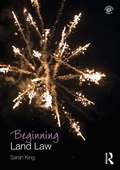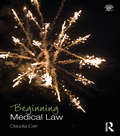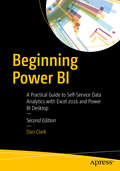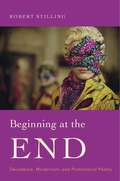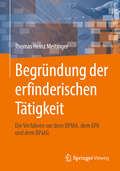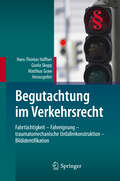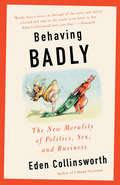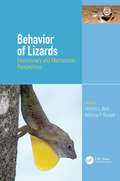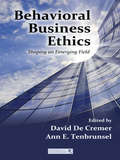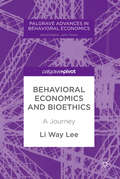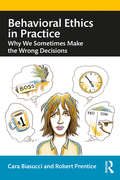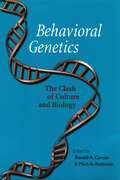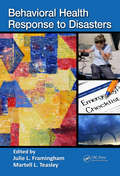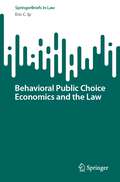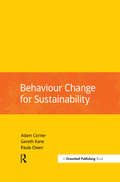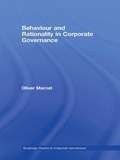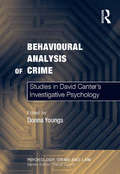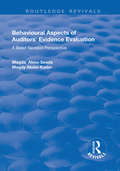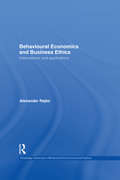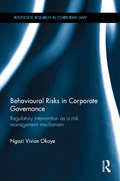- Table View
- List View
Beginning Land Law (Beginning the Law)
by Sarah KingWhether you’re new to higher education, coming to legal study for the first time or just wondering what Land Law is all about, Beginning Land Law is the ideal introduction to help you hit the ground running. Starting with the basics and an overview of each topic, it will help you come to terms with the structure, themes and issues of the subject so that you can begin your Land Law module with confidence. Adopting a clear and simple approach with legal vocabulary explained in a detailed glossary, Sarah King breaks the subject of Land Law down using practical everyday examples to make it understandable for anyone, whatever their background. Diagrams and flowcharts simplify complex issues, important cases are identified and explained and on-the- spot questions help you recognise potential issues or debates within the law so that you can contribute in classes with confidence. Beginning Land Law is an ideal first introduction to the subject for LLB, GDL or ILEX and especially international students, those enrolled on distance learning courses or on other degree programmes.
Beginning Medical Law (Beginning the Law)
by Claudia CarrWhether you’re new to higher education, coming to legal study for the first time or just wondering what Medical Law is all about, Beginning Medical Law is the ideal introduction to help you hit the ground running. Starting with the basics and an overview of each topic, it will help you come to terms with the structure, themes and issues of the subject so that you can begin your Medical Law module with confidence. Adopting a clear and simple approach with legal vocabulary carefully clarified, Claudia Carr breaks the subject of Medical Law down using practical everyday examples to make it understandable for anyone, whatever their background. Diagrams and flowcharts simplify complex issues, important cases are identified and explained and on-the- spot questions help you recognise potential issues or debates within the law so that you can contribute in classes with confidence. Beginning Medical Law is an ideal first introduction to the subject for LLB, GDL or ILEX and especially international students, those enrolled on distance learning courses or on other degree programmes.
Beginning Power BI: A Practical Guide to Self-Service Data Analytics with Excel 2016 and Power BI Desktop
by Dan ClarkAnalyze your company's data quickly and easily using Microsoft's latest tools. You will learn to build scalable and robust data models to work from, clean and combine different data sources effectively, and create compelling visualizations and share them with your colleagues. Author Dan Clark takes you through each topic using step-by-step activities and plenty of screen shots to help familiarize you with the tools. This second edition includes new material on advanced uses of Power Query, along with the latest user guidance on the evolving Power BI platform. Beginning Power BI is your hands-on guide to quick, reliable, and valuable data insight. What You'll Learn Simplify data discovery, association, and cleansing Build solid analytical data models Create robust interactive data presentations Combine analytical and geographic data in map-based visualizations Publish and share dashboards and reports Who This Book Is For Business analysts, database administrators, developers, and other professionals looking to better understand and communicate with data
Beginning at the End: Decadence, Modernism, and Postcolonial Poetry
by Robert Stilling StillingDuring the struggle for decolonization, Frantz Fanon argued that artists who mimicked European aestheticism were “beginning at the end,” skipping the inventive phase of youth for a decadence thought more typical of Europe’s declining empires. Robert Stilling takes up Fanon’s assertion to argue that decadence became a key idea in postcolonial thought, describing both the failures of revolutionary nationalism and the assertion of new cosmopolitan ideas about poetry and art. In Stilling’s account, anglophone postcolonial artists have reshaped modernist forms associated with the idea of art for art’s sake and often condemned as decadent. By reading decadent works by J. K. Huysmans, Walter Pater, Henry James, and Oscar Wilde alongside Chinua Achebe, Derek Walcott, Agha Shahid Ali, Derek Mahon, Yinka Shonibare, Wole Soyinka, and Bernardine Evaristo, Stilling shows how postcolonial artists reimagined the politics of aestheticism in the service of anticolonial critique. He also shows how fin de siècle figures such as Wilde questioned the imperial ideologies of their own era. Like their European counterparts, postcolonial artists have had to negotiate between the imaginative demands of art and the pressure to conform to a revolutionary politics seemingly inseparable from realism. Beginning at the End argues that both groups—European decadents and postcolonial artists—maintained commitments to artifice while fostering oppositional politics. It asks that we recognize what aestheticism has contributed to politically engaged postcolonial literature. At the same time, Stilling breaks down the boundaries around decadent literature, taking it outside of Europe and emphasizing the global reach of its imaginative transgressions.
Begleitung von Flüchtlingen mit traumatischen Erfahrungen
by Ulrike Imm-Bazlen Anne-Kathrin SchmiegDieses Buch bietet Ihnen das nötige Grundlagenwissen zur Begleitung von traumatisierten Menschen und das Wissen um Methoden, die auch bei geringen Deutschkenntnissen angewendet werden können. Unter anderem werden darin folgende Fragen beantwortet: Was ist ein Trauma? Wie entsteht es? Wie kann es erkannt werden? Welche Schicksale verbergen sich hinter der Bezeichnung "Flüchtling" bzw. "Flüchtling mit traumatischen Erfahrungen"? Im Mittelpunkt dieses Buches stehen Menschen: der (traumatisierte) Flüchtling und Sie als sein Begleiter. Dabei beeinflussen Sie sich gegenseitig. Entsprechend wichtig ist die Frage, wen der Flüchtling sieht. Was bringen Sie bewusst oder unbewusst in die Begleitung ein? Und so kann es in mehrfacher Hinsicht ein absolut spannendes Buch für Sie werden, das weit über die Vermittlung von Grundlagenwissen hinaus geht. Es lädt Sie auch zu einer Entdeckungsreise zu sich selbst ein. Aber schauen Sie selbst. . .
Begründung der erfinderischen Tätigkeit: Die Verfahren vor dem DPMA, dem EPA und dem BPatG
by Thomas Heinz MeitingerEin Patent kann für ein Unternehmen ein sehr wichtiges Asset sein. Der Weg dorthin ist jedoch steinig. Nur Erfindungen, die bislang noch nirgends zu finden sind und die außerdem eine erfinderische Leistung aufweisen, werden zum Patent erteilt. Die wichtigen Kriterien zur Patenterteilung sind daher Neuheit und erfinderische Tätigkeit. Die Begründung der erfinderischen Tätigkeit entscheidet regelmäßig in den Erteilungsverfahren vor den Patentämtern, dem Deutschen Patent- und Markenamt (DPMA) und dem Europäischen Patentamt (EPA), und bei streitigen Verfahren vor dem Bundespatentgericht (BPatG) über den Ausgang des Verfahrens. Dem Patentierungskriterium der erfinderischen Tätigkeit gebührt daher die größte Beachtung. Dieses Fachbuch gibt dem Leser das rechtliche Know-How, um in den jeweiligen Verfahren vor dem DPMA, dem EPA und dem BPatG erfolgreich die erfinderische Tätigkeit seiner Erfindung zu begründen bzw. in streitigen Verfahren einen erfolgreichen Angriff gegen ein Patent eines Dritten zu führen.
Begutachtung im Verkehrsrecht: Fahrtüchtigkeit - Fahreignung - traumatomechanische Unfallrekonstruktion - Bildidentifikation
by Matthias Graw Gisela Skopp Hans-Thomas HaffnerDie Aufgabe des Gutachters im Gerichtsverfahren ist es, Juristen die Fachkenntnisse zu vermitteln, die für die Beurteilung eines Sachverhalts notwendig sind. Um diesen Vermittlungsprozess im Bereich der Verkehrsmedizin zu unterstützen, haben die Autoren das wissenschaftliche Basiswissen verständlich aufbereitet - von der forensischen Toxikologie über die biomechanische Unfallrekonstruktion bis zur anthropologischen Bildidentifikation. Sie zeigen die Möglichkeiten und Grenzen der Begutachtung auf und illustrieren dies anhand konkreter Fallbeispiele.
Begutachtung psychischer Störungen
by Frank Schneider Helmut Frister Dirk OlzenBegutachtungen von Menschen mit psychischen Störungen sind anspruchsvoll und gelten als schwierig. Das vorliegende Standardwerk bietet deshalb einen kompakten und gleichzeitig praxisnahen Leitfaden für ärztliche und psychologische Sachverständige, aber auch eine unverzichtbare und umfassende Grundlage für Juristen. Denn richtige und faire Entscheidungen der Gerichte können nur gefällt werden, wenn sich Mediziner, Psychologen und Juristen untereinander verständigen können. Dieses Buch leistet einen wesentlichen Beitrag zu diesem nicht immer einfachen, aber notwendigen und nicht zuletzt besonders interessanten und spannenden interdisziplinären Austausch. Das Werk zeichnet sich aus durch eine praxisbezogene, verständliche und klare Darstellung der wesentlichen Aspekte der psychiatrischen und psychologischen Begutachtung, ausführliche Beispielgutachten sowie zahlreiche Fallbeispiele aus der Praxis viele Tipps zum Erstellen eines Gutachtens die Darstellung des aktuellen Stands der medizinischen, psychologischen und juristischen Literatur, inklusive der neuesten Rechtsprechung und Gesetzgebung. Mit der nun vorliegenden vierten Auflage wurde das Werk zudem grundlegend aktualisiert. Das Buch ist ein wertvoller Begleiter für Mediziner, Psychologen, Juristen und alle anderen Interessierten, die mit psychiatrischen und psychologischen Gutachten zu tun haben.
Begutachtung psychischer Störungen
by Frank Schneider Helmut Frister Dirk OlzenBegutachtungen von Menschen mit psychischen Störungen sind anspruchsvoll und gelten als schwierig. Das vorliegende Standardwerk bietet deshalb einen kompakten und gleichzeitig praxisnahen Leitfaden für ärztliche und psychologische Sachverständige, aber auch eine unverzichtbare und umfassende Grundlage für Juristen. Denn richtige und faire Entscheidungen der Gerichte können nur gefällt werden, wenn sich Mediziner, Psychologen und Juristen untereinander verständigen können. Dieses Buch leistet einen wesentlichen Beitrag zu diesem nicht immer einfachen, aber notwendigen und nicht zuletzt besonders interessanten und spannenden interdisziplinären Austausch. Das Werk zeichnet sich aus durch eine praxisbezogene, verständliche und klare Darstellung der wesentlichen Aspekte der psychiatrischen und psychologischen Begutachtung, ausführliche Beispielgutachten sowie zahlreiche Fallbeispiele aus der Praxis viele Tipps zum Erstellen eines Gutachtens die Darstellung des aktuellen Stands der medizinischen, psychologischen und juristischen Literatur, inklusive der neuesten Rechtsprechung und Gesetzgebung. Das Buch ist ein wertvoller Begleiter für Mediziner, Psychologen, Juristen und alle anderen Interessierten, die mit psychiatrischen und psychologischen Gutachten zu tun haben. Mit der fünften Auflage wurde es erneut überarbeitet und aktualisiert. So wird beispielsweise bereits Bezug genommen auf die künftige ICD-11-Klassifikation, es werden aktuelle gesetzliche Änderungen, z.B. im Betreuungsrecht und bei der Behandlung von Kindern mit Varianten der Geschlechtsentwicklung (§ 1631e BGB), das neue 14. Buch des Sozialgesetzbuches, das neue Strafrechtsbezogene Unterbringungsgesetz NRW, die geänderten Voraussetzungen für die Unterbringung in einer Entziehungsanstalt (§ 64 StGB) sowie geänderte juristische Terminologien und aktuelle Literatur berücksichtigt.
Behandlungsfehler und Haftpflicht in der Viszeralchirurgie
by Hans-Peter Bruch Jörg Heberer Joachim Jähne Jürgen BauchDie Vermeidung von Behandlungsfehlern und der Umgang mit haftungsrechtlichen Konsequenzen ist für Chirurgen ein Thema von wachsender Bedeutung. In dem Band werden die rechtlichen Grundlagen, Verhaltensregeln und Verfahren der rechtlichen Klärung für die Viszeralchirurgie umfassend aufgearbeitet. Renommierte Kliniker beschreiben mögliche Behandlungsfehler, liefern Hinweise zur Fehlervermeidung und zeigen die rechtlichen Konsequenzen auf. Dabei werden sowohl konventionelle Operationsverfahren als auch die minimal invasive Chirurgie berücksichtigt.
Behaving Badly: The New Morality in Politics, Sex, and Business
by Eden CollinsworthWhat is the relevance of morality today? Eden Collinsworth enlists the famous, the infamous, and the heretofore unheard-of to unravel how we make moral choices in an increasingly complex—and ethically flexible—age. To call these unsettling times is an understatement: our political leaders are less and less respectable; in the realm of business, cheating, lying, and stealing are hazily defined; and in daily life, rapidly changing technology offers permission to act in ways inconceivable without it. Yet somehow, this hasn’t quite led to a complete free-for-all—people still draw lines around what is acceptable and what is not. Collinsworth sets out to understand how and why. In her intrepid quest, she squares off with a prime minister, the editor of London’s Financial Times, a holocaust survivor, a pop star, and a former commander of the U.S. Air Force to grapple with the impracticality of applying morals to foreign policy; precisely when morality gets lost in the making of money; what happens to morality without free will; whether “immoral” women are just those having a better time; why celebrities have become the new moral standard-bearers; and if testosterone is morality’s enemy or its hero.
Behavior of Lizards: Evolutionary and Mechanistic Perspectives
by Anthony Russell Vincent BelsKey features: Presents a contemporary snapshot of the mechanisms underlying the evolution and adaptation of behavior Explores how genetics, epigenetics, development, and environment shape behavior Discusses a broad range of behavioral repertoires and responses, including those related to thermoregulatory, foraging, predatory, displaying, social and escape strategies. Examines physiological and sensory mechanisms Covers the effects of various aspects of global change on behavior, with chapters that focus on the impacts of climate change on hydroregulatory behavior and behavioral responses to the effects of habitat alteration resulting from human-mediated change and colonization by invasive species. Lizards serve as focal organisms for many of biological questions related to evolution, ecology, physiology, and morphology. They are studied at multiple spatial and temporal scales, from the individual to the community level. This book, authored by expert contributors from around the world, explores behaviors underlying the evolution and adaptation of these organisms. It covers conceptual, empirical, and methodological approaches to the understanding of the role that natural and sexual selection play in molding the behavioral traits of lizards. This thorough, illustrated reference should stimulate discussion of the conceptual and methodological approaches for studying the behavioral traits of these fascinating and highly diverse vertebrates.
Behavioral Business Ethics: Shaping an Emerging Field (Organization and Management Series)
by Ann E. Tenbrunsel David De CremerThis book takes a look at how and why individuals display unethical behavior. It emphasizes the actual behavior of individuals rather than the specific business practices. It draws from work on psychology which is the scientific study of human behavior and thought processes. As Max Bazerman said, "efforts to improve ethical decision making are better aimed at understanding our psychological tendencies."
Behavioral Economics and Bioethics: A Journey (Palgrave Advances In Behavioral Economics Ser.)
by Li Way LeeThis book takes readers on a journey through the wide universe of bioethics, raising the following question: what is the proper attitude towards health, life, and death from the perspective of contemporary behavioral economics? Drawing on fields as diverse as economics, ethics, ecology, biology, and philosophy, this book seeks to uncover the bioethics we accomplish, not the moral principles that we advocate. This book covers life-and-death issues arranged around five themes: selves, persons, populations, species, and “Future Earth”. Ultimately, the author illustrates two kinds of justice: static and dynamic. Static justice prevails whenever parties are free to bargain with each other, while dynamic justice follows from parties' interactions over time. An examination into these types of justice reveals one particularly striking phenomenon: attempts by others to tip the balance of justice have a tendency to backfire. Of primary interest to behavioral economists, this book will also appeal to scholars studying bioethics, ecology, medicine, and philosophy, as well as all people dealing with issues of health, dying, and death.
Behavioral Ethics in Practice: Why We Sometimes Make the Wrong Decisions
by Cara Biasucci Robert PrenticeThis book is an accessible, research-based introduction to behavioral ethics. Often ethics education is incomplete because it ignores how and why people make moral decisions. But using exciting new research from fields such as behavioural psychology, cognitive science, and evolutionary biology, the study of behavioural ethics uncovers the common reasons why good people often screw up. Scientists have long studied the ways human beings make decisions, but only recently have researchers begun to focus specifically on ethical decision making. Unlike philosophy and religion, which aim to tell people how to think and act about various moral issues, behavioral ethics research reveals the factors that influence how people really make moral decisions. Most people get into ethical trouble for doing obviously wrong things. Aristotle cannot help, but learning about behavioral ethics can. By supplementing traditional approaches to teaching ethics with a clear, detailed, research-based introduction to behavioral ethics, beginners can quickly become familiar with the important elements of this new field. This book includes the bonus of being coordinated with Ethics Unwrapped – a free, online, educational resource featuring award-winning videos and teaching materials on a variety of behavioral ethics (and general ethics) topics. This book is a useful supplement for virtually every ethics course, and important in any course where incorporating practical ethics in an engaging manner is paramount. The content applies to every discipline –business ethics, journalism, medicine, legal ethics, and others – because its chief subject is the nature of moral decision making. The book is also highly relevant to practitioners across all sectors.
Behavioral Genetics: The Clash of Culture and Biology
by Ronald A. Carson and Mark A. RothsteinScientists conducting human genome research are identifying genetic disorders and traits at an accelerating rate. Genetic factors in human behavior appear particularly complex and slow to emerge, yet are raising their own set of difficult ethical, legal, and social issues. In Behavioral Genetics: The Clash of Culture and Biology, Ronald Carson and Mark Rothstein bring together well-known experts from the fields of genetics, ethics, neuroscience, psychiatry, sociology, and law to address the cultural, legal, and biological underpinnings of behavioral genetics. The authors discuss a broad range of topics, including the ethical questions arising from gene therapy and screening, molecular research in psychiatry, and the legal ramifications and social consequences of behavioral genetic information. Throughout, they focus on two basic concerns: the quality of the science behind behavioral genetic claims and the need to formulate an appropriate, ethically defensible response when the science turns out to be good.
Behavioral Genetics: The Clash of Culture and Biology
by Ronald A. Carson and Mark A. RothsteinNine essays examining the ethical, cultural, legal, and biological underpinnings of behavioral genetics.Scientists conducting human genome research are identifying genetic disorders and traits at an accelerating rate. Genetic factors in human behavior appear particularly complex and slow to emerge, yet are raising their own set of difficult ethical, legal, and social issues. In Behavioral Genetics: The Clash of Culture and Biology, Ronald Carson and Mark Rothstein bring together well-known experts from the fields of genetics, ethics, neuroscience, psychiatry, sociology, and law to address the cultural, legal, and biological underpinnings of behavioral genetics. The authors discuss a broad range of topics, including the ethical questions arising from gene therapy and screening, molecular research in psychiatry, and the legal ramifications and social consequences of behavioral genetic information. Throughout, they focus on two basic concerns: the quality of the science behind behavioral genetic claims and the need to formulate an appropriate, ethically defensible response when the science turns out to be good.“This book is well written and stimulating. The issues it raises are important for scientists and for those working in the legal and social-services fields, but they clearly also have relevance for everyone.” —The New England Journal of Medicine“This . . . is the best introduction to behavioral genetics that I have read. The varying viewpoints . . . are presented with such clarity that [this book] should appeal to the general public and serve as a basic text for college courses.” —Jay Katz, Elizabeth K. Dollard Professor Emeritus of Law, Medicine, and Psychiatry, Harvey L. Karp Professiorial Lecturer in Law and Psychoanalysis, Yale Law School
Behavioral Health Response to Disasters
by Julie L. Framingham, Martell L. TeasleyDisasters can cause long-term disruptions to the routines of individuals and communities, placing survivors at risk of developing serious mental health and substance abuse problems. Disaster behavioral health services provide emotional support, help normalize stress reactions, assess recovery options, and encourage healthy coping behaviors. They al
Behavioral Public Choice Economics and the Law (SpringerBriefs in Law)
by Eric C. IpThis book provides an accessible introduction to the emerging field of behavioral public choice economics and the law. This field studies how public officials, lawmakers, and judges fall prey to their own biases and heuristics, and how constitutions and judicial doctrines can be structured to mitigate these cognitive shortcomings. Written lucidly in plain language, this book is invaluable to all students, scholars, and general readers interested in behavioral economics, law and economics, and political economy.
Behaviour Change for Sustainability
by Adam Corner Gareth Kane Paula OwenBehaviour Change for Sustainability is a compilation of 3 bestselling sustainability guides that gathers together, in one place, a variety of effective tools and techniques for encouraging a lasting shift to sustainable behaviours in business and society. Promoting Sustainable Behaviour offers the definitive guide to building a sustainable behaviour campaign that works. By summarising "what really works" and pulling out the most important messages from the evidence base, this book contains all the tools you need to maximize the success of your sustainable behaviour initiative – in households, when commuting, in the workplace and beyond. Green Jujitsu outlines the smart way to embed sustainability within the culture of any organization, by working with employees' strengths and interests. Gareth Kane points out the hallmarks of unsuccessful approaches to cultural change, which are often confused, unimaginative or confrontational. He puts forward an alternative framework designed to play to people's strengths and interests and genuinely engage them in problem-solving. Gamification is fast emerging as a user engagement and behaviour change tool that succeeds where other tactics and strategies have failed. How Gamification Can Help Your Business Engage in Sustainability contains all the information businesses and other organizations need to make an informed decision about whether to adopt gamification as part of their own business and sustainability strategies – and the tools to get started.
Behaviour and Rationality in Corporate Governance (Routledge Studies In Corporate Governance Ser.)
by Oliver MarnetCorporate scandals due to bad accounting happen far too frequently for a system of corporate governance to be deemed effective. This book tells why the safeguards designed to prevent bad accounting so often fail. By studying why the auditors and members of a board of directors regularly fail to deliver the truth about a company‘s financ
Behavioural Analysis of Crime: Studies in David Canter's Investigative Psychology (Psychology, Crime and Law)
by Donna YoungsThe intense interest in 'offender profiling' generated by FBI special agents, gave rise to an explosion of studies in a new area called ’investigative psychology’ by its originator David Canter. This develops understanding of offenders' behaviour that can be harnessed to improve investigations. In this rapidly developing area much has been learnt about what offenders reveal about themselves through their styles of offending. Beyond criminals’ actions the location of their crimes can also reveal where the offender lives or which offences can be linked as part of the same series. Investigative psychologists also explore how to interview witnesses and suspects and assess the veracity of accounts given. The variation in criminal style across crimes as diverse as arson, burglary, hostage negotiation, serial killing and sexual assault is reviewed, using narrative theory and criminals’ emotional experience when offending as the basis for explaining these variations. This provides a framework for drawing inferences about offenders' characteristics. Studies in investigative psychology require a special methodology, developed by David Canter to allow scientific explorations in such a challenging field, previously assumed not to be open empirical study. The practical potential and applications of the research are given, as well as a selection of commentaries on the cutting edge debates that are driving the future of the investigative psychology. This new discipline is of relevance to forensic psychologists in many different settings, criminologists and law enforcement agencies, bringing together work that lays out current achievements and sets the agenda for future research in the field.
Behavioural Aspects of Auditors' Evidence Evaluation: A Belief Revision Perspective
by Magda Abou-Seada Magdy Abdel-KaderThis title was first published in 2003. Based on psychological research, auditing studies have focused on 'belief revision' as a way of understanding how auditors evaluate evidence. Moreover a belief revision process is consistent with US auditing standards. UK standards on the other hand do not appear to give guidance on the process to follow when evaluating evidence. Research in the US indicates that auditors do in fact follow a belief revision process in accordance with US standards. Employing survey research (based on personal interviews with a number of experienced UK auditors) this book demonstrates how auditors prefer to be described as following the open mind approach. Building on the findings of the interviews the book then describes an experimental study to investigate the differences between the belief revision and open mind approaches in terms of their effect on the efficiency and effectiveness of the audit process. The book concludes that the belief revision approach would improve the efficiency of the audit process without affecting its effectiveness or outcomes.
Behavioural Economics and Business Ethics: Interrelations and Applications (Routledge Advances In Behavioural Economics And Finance Ser. #1)
by Philip Alexander RajkoEconomics and moral philosophy have in recent years been considered to be distinct and separate fields. However, behavioural economics has started to reconcile various aspects of morality and economics, which has offered new conceptual opportunities to advance economics ethics and business ethics. This book aims to advance economic ethics and business ethics by combining normative principles and empirical evidence grounded on the key motivational forces in economic decision making. It has three core objectives: to assess order ethics as a theory of both economic ethics and business ethics, using behavioural economics methods and evidence; to identify cardinal virtues for modern business ethics; to to set up valuable guidelines for the implementation of economic ethics and business ethics.
Behavioural Risks in Corporate Governance: Regulatory Intervention as a Risk Management Mechanism (Routledge Research in Corporate Law)
by Ngozi Vivian OkoyeRecent cases of corporate failures, including the fixing of LIBOR rates and money laundering issues in the banking industry, highlight how behavioural issues on the part of company directors are significant contributory factors in corporate governance and the success or failure of companies. This book examines how personality and behavioural issues have contributed to major corporate failures, and how this risk may be managed. The book examines behavioural risks in corporate governance, and evaluates the extent to which risk management mechanisms have acknowledged various aspects of behaviour. Drawing from cases in the UK, the US and Australia and research in psychology and the behavioural sciences, Ngozi Vivian Okoye argues that current corporate governance mechanisms lack provision for identifying and managing personality risks, and suggests how constituent elements of behaviour should be engaged with when developing preventive mechanisms for corporate failures. Okoye presents a conceptual framework for identifying and managing personality risks, and explores how personality risk may be built into corporate governance regulation. The book will be of great use and interest to researchers and practitioners in business and company law, corporate governance, and critical management studies.
